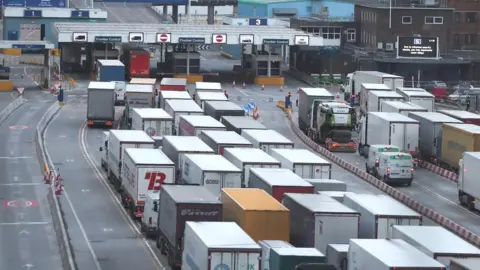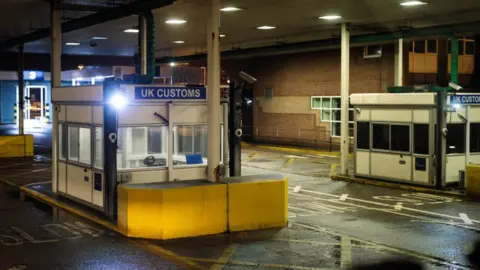Brexit: The plan to force companies to be no-deal ready

 AFP/Getty Images
AFP/Getty ImagesThere are many mysteries about the government's response to the leak of a confidential internal no-deal document.
As we have reported before, the most important assumption of freight trade flow through Dover and the Channel Tunnel after a no-deal Brexit is now that it could fall by 40-60%. That figure features heavily in the report.
The change, an improvement on even worse assumptions, only occurred last month, suggesting it is difficult to describe the document as old.
And it's not certain, as "Number 10 sources" have suggested, that it was leaked by a former Cabinet minister trying to sabotage the prime minister's visits to EU leaders.
Where Michael Gove is demonstrably correct is that this assumption is termed to be a "reasonable worst-case scenario". He may very well consider that it does not include various new policies that have been considered under what the government refers to as its "turbo-charging" of the preparation of no deal.
We are about to get new detail on these plans, as early as this week, I understand.
A decision in principle has been made to simply hand out a customs number to every VAT-registered business that trades solely with the EU. This "auto-enrolment" has been called for by various trade groups.
Additionally millions of pounds of taxpayers money will be offered via a 'Business Resilience Fund' to trade bodies to carry out training on customs for these business.
 Getty Images
Getty ImagesOn the first measure, 10,000 businesses can be auto-enrolled a day, meaning that it will take a fortnight or so for the exercise to be completed, and all these companies to receive a letter from HMRC.
HMRC has identified about 250,000 companies who need these "EORI" numbers, and of these 150,000 are VAT-registered (annual turnover above £85,000) and will be auto-enrolled, though some will have already enrolled.
Companies need an EORI number (Economic Operator Registration and Identification) to move goods into or out of the EU.
The information provided by the number is used by customs authorities, government departments and other agencies to keep track of goods.
The government has warned that companies that do not have one "may have increased costs and delays" in the event of a no-deal Brexit.
The reason for auto-enrolment is that voluntarily encouraging people to enrol has yielded just 71,000 registrations out of the 250,000 needed.
Enrolment is only the absolute basic foundation level step in order to be able to complete the customs declarations that will be compulsory after no deal. It is this foundational lack of preparation that will cause the bulk of the problems and queues across Kent, under the government's reasonable worst-case scenarios.
So auto-enrolment might help. But it is best seen as a type of registration for the service. On top of that, traders will have to train to make declarations, make extra time for shipments, access and appoint a customs agent (and some assessments estimate there is a shortfall of 10-20,000) and weigh their goods. None of this is required as part of the EU.
Controversial move
That is why the government will also announce funding for training to go through business lobby groups too.
Some argue this is highly controversial. Most of the lobby groups, while playing a constructive role in no-deal contingencies, are very much against leaving without a deal. There is slight suspicion that the groups are being lined up as the fall guys if trader readiness proves to be the Achilles heel of Brexit preparation. Also if they do not get an EORI number until September, it only leaves a matter of weeks before 31 October to train 250,000 businesses.
Then there is also the issue of the 100,000 smallest businesses, that are not VAT-registered, and are the hardest to reach. Some representatives communicated a concern that HMRC would use this as a means to hit small companies with VAT registration too. The government appears sensitive to this. But getting to these businesses in time seems rather challenging.
The bigger point here is that the EORI number really is just the first step. There are Common Transit Convention barcodes, actual customs declarations, animal origin and plant health checks, and export health certificates too.
The last point is that HMRC was well aware of the option of auto-enrolment, as it occurs in other countries. They chose against it because they wanted the enrolment process to allow companies to think and become engaged. Simply having to do it automatically, rather underlines tens of thousands of businesses aren't taking it seriously. Given that the PM has argued that the chances of no deal is a "million to one" why would they spend a healthy chunk of their working capital?
It is a vivid example of how readiness for no deal can not just be declared by government or ministers. It is in the hands of individual businesses, who have been marched up various hills before. The ones that spent nothing on preparation in March are the ones who saved money. Now the government will do the first step for them and throw money at the problem.
